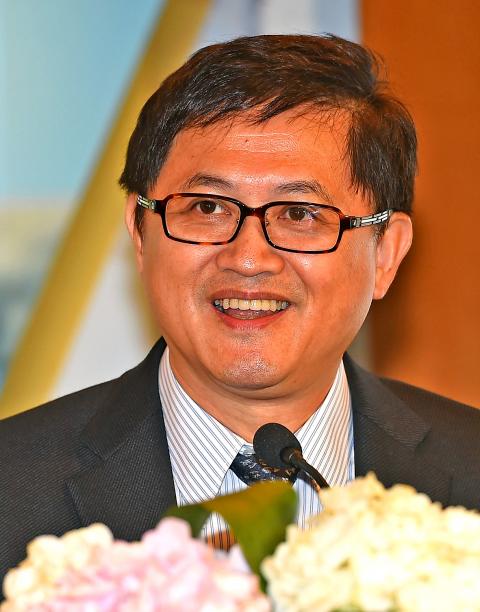Pegatron Corp (和碩), one of Apple Inc’s iPhone assemblers, is to expand the production capacity of its plant in Kunshan, China, in the next two years to meet rising demand from its clients.
“Hypothetically speaking, if the Kunshan plant has 10,000 workers at the moment, the number would double next year and then quadruple the year after that,” Pegatron chairman Tung Tzu-hsien (童子賢) told reporters on the sidelines of the 2015 IT Month opening ceremony in Taipei.
IT Month, an annual fair, is to run through Sunday in Taipei, then move on to Taichung from Dec. 11 to Dec. 16, to Kaohsiung from Dec. 24 to Dec. 29 and to Tainan from Jan. 8 to Jan. 13.

Photo: Chang Chia-ming, Taipei Times
Pegatron has allocated US$300 million for capital expenditure this year, mainly focusing on building new plants in China. The company is yet to finalize its capital expenditure plan for next year yet.
The Kunshan plant previously assembled older-generation iPhones, but Pegatron moved some of the new iPhone production lines from its Shanghai plant to Kunshan this quarter in a bid to ease the burden on the Shanghai plant, according to sources familiar with the matter.
Tung said that the two-year expansion plan for the Kunshan plant would not necessary involve the same product line, adding that if a strong demand for the product does not materialize in the market, Pegatron would adjust its product lines.
When asked if demand for the iPhone 6S is weaker than last year’s iPhone 6, Tung said: “The market is focusing too much on the new model and ignores the fact that the combined demand for new and previous models has not declined.”
“Let us not forget that the demand for the iPhone 4S was still very strong when the iPhone 5 hit the market,” Tung said, adding: “I could only say the situation now is quite similar. Overall, Pegatron has seen the combined orders for new and old iPhone models grow significantly from last year,” he said.
Pegatron chief financial officer Charles Lin (林秋炭) on Nov. 9 told investors that revenue this quarter is expected to jump 30 percent from last quarter’s NT$311.84 billion (US$9.5 billion) and reach a peak for this year.
CIMB Securities Ltd forecast Pegatron’s revenue would grow more than 35 percent quarterly this quarter, thanks to strong smartphone orders from Apple and Asustek Computer Inc (華碩), as well as contribution from new notebook computer models.
Moreover, being the sole assembler for Microsoft Corp’s Surface Pro 4 tablet and the Surface Book laptops, the income from the two products might contribute about 5 percent to Pegatron’s revenue this quarter, CIMB said in a note on Nov. 10.
In the first 10 months of this year, Pegatron’s revenues totaled NT$976.58 billion, increasing 24.12 percent from the same period last year.

HANDOVER POLICY: Approving the probe means that the new US administration of Donald Trump is likely to have the option to impose trade restrictions on China US President Joe Biden’s administration is set to initiate a trade investigation into Chinese semiconductors in the coming days as part of a push to reduce reliance on a technology that US officials believe poses national security risks. The probe could result in tariffs or other measures to restrict imports on older-model semiconductors and the products containing them, including medical devices, vehicles, smartphones and weaponry, people familiar with the matter said. The investigation examining so-called foundational chips could take months to conclude, meaning that any reaction to the findings would be left to the discretion of US president-elect Donald Trump’s incoming team. Biden

In a patch of South America rich in lithium, used to make batteries for electric cars and other tech, Bolivia is lagging its neighbors in the race to mine the key metal. An area called the “lithium triangle” which spills over the borders of Bolivia, Chile and Argentina is home to 60 percent of the world’s lithium reserves, according to the US Geological Survey. Bolivia claims to have Earth’s largest deposit of the metal, used to make rechargeable batteries for smartphones, laptops and other devices besides e-vehicles. However, Bolivia has undertaken only four pilot projects and is running just one

INVESTMENT: Jun Seki, chief strategy officer for Hon Hai’s EV arm, and his team are currently in talks in France with Renault, Nissan’s 36 percent shareholder Hon Hai Precision Industry Co (鴻海精密), the iPhone maker known as Foxconn Technology Group (富士康科技集團) internationally, is in talks with Nissan Motor Co’s biggest shareholder Renault SA about its willingness to sell its shares in the Japanese automaker, the Central News Agency (CNA) said, citing people it did not identify. Nissan and fellow Japanese automaker, Honda Motor Co, are exploring a merger that would create a rival to Toyota Motor Corp in Japan and better position the combined company to face competitive challenges around the world, people familiar with the matter said on Wednesday. However, one potential spanner in the works is

HON HAI LURKS: The ‘Nikkei’ reported that Foxconn’s interest in Nissan accelerated the Honda-merger effort out of fears it might be taken over by the Taiwanese firm Nissan Motor Co has become the latest buyout target in Japan as it explores a merger with Honda Motor Co and faces an overture from Hon Hai Precision Industry Co (鴻海精密), known as Foxconn Technology Group (富士康科技集團) internationally. Shares in Nissan yesterday jumped 24 percent, the most on record, to hit the daily limit, after the two Japanese automakers acknowledged that talks are ongoing to better position themselves for competitive challenges during a time of upheaval in the global auto industry. Foxconn — a Taipei-based manufacturer of iPhones, which has been investing heavily in factories to build electric vehicles — has also